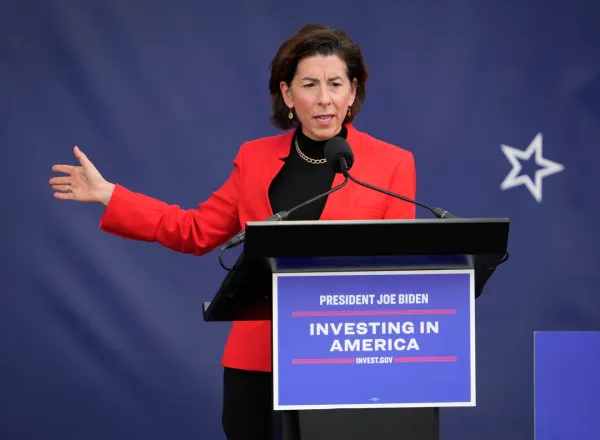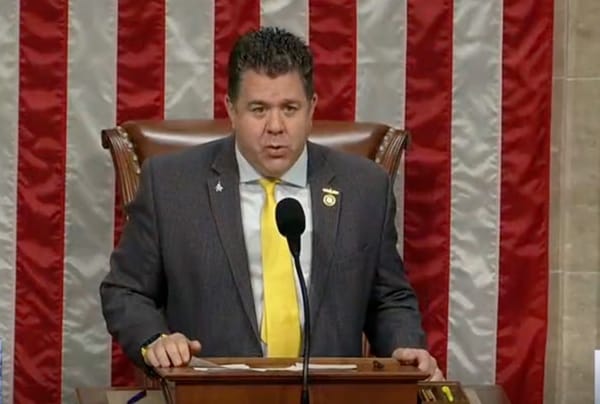Google Sued for Anti-Competitive Advertising, Trump Sued Over Section 230, Georgia Broadband Investment
A lawsuit filed Wednesday by a coalition of ten Republican state attorneys general, led by Texas Attorney General Ken Paxton, accuses Google of making an “unlawful agreement” with Facebook, that gave special privileges to the social media giant, in exchange for promising not to support a competing a

A lawsuit filed Wednesday by a coalition of ten Republican state attorneys general, led by Texas Attorney General Ken Paxton, accuses Google of making an “unlawful agreement” with Facebook, that gave special privileges to the social media giant, in exchange for promising not to support a competing ad system.
The complaint, filed in U.S. District Court in Texas, alleges that Facebook emerged in 2017 as a powerful new rival to Google, challenging the unit’s established dominance in online advertising.
The lawsuit claims that Google responded by initiating an agreement in which Facebook would curtail its competitive moves, in return for guaranteed special treatment in Google-run ad auctions.
Paxton announced the suit, saying Google is using its “monopolistic power” to control pricing of online advertisements, fixing the market in its favor and eliminating competition. “This Goliath of a company is using its power to manipulate the market, destroy competition, and harm you, the consumer,” Paxton said, in a video posted on Twitter.
Google denied engaging in any anticompetitive behavior and repeated its stance that it operates in highly competitive markets.
“Attorney General Paxton’s ad tech claims are meritless, yet he’s gone ahead in spite of all the facts. We’ve invested in state-of-the-art ad tech services that help businesses and benefit consumers,” a Google spokesperson said Wednesday, according to the Wall Street Journal. “We will strongly defend ourselves from his baseless claims in court.” The spokesperson said that the allegation about Facebook isn’t accurate and that the company doesn’t receive special data.
Texas is bringing the suit along with other Republican attorneys general from Arkansas, Idaho, Indiana, Kentucky, Mississippi, Missouri, North Dakota, South Dakota and Utah. Noticeably absent were Democrats who had initially joined Texas in launching a bipartisan state investigation of Google last fall.
A separate, bipartisan group of state attorneys general is preparing another antitrust case against Google, which is expected to target its search business and could be filed as soon as Thursday.
Americans for Prosperity Foundation sues Trump administration for Section 230 records
The free-market oriended Americans for Prosperity Foundation sued the U.S. Department of Commerce late Monday, asking the agency to turn over records that could shine a light on the Trump administration’s push to narrow Section 230 of the Communications Decency Act, eroding protections for social media platforms’ content moderation decisions.
According to the group’s complaint, filed in D.C. federal court, the Commerce Department’s telecom regulatory branch has failed to disclose the communications of two key officials related to the internet liability shield, including Nathan Simington, who was recently appointed to the Federal Communications Commission.
The foundation said it filed a federal records request in September seeking correspondence from the acting head of the National Telecommunications and Information Administration, Adam Candeub, and Simington, who held the role of a senior adviser.
Although NTIA turned over some documents, the foundation claims that the agency has not been forthcoming with the requested records, reports Law360.
“The limited documents NTIA has disclosed from our Freedom of Information Act request contain numerous redactions, raising serious concerns about what NTIA is withholding,” said Eric Bolinder, the foundation’s policy counsel. “Mr. Candeub’s use of a private email for government business only heightens this concern.”
Georgia’s Public Service Commission approves measures to promote broadband investment
Efforts to provide broadband to unserved areas of Georgia took another step forward on Tuesday, following a Public Service Commission decision determining the fee paid by cable companies to attach wires and cables to electric membership cooperative utility poles.
In an administrative session, the Commission unanimously approved a motion requiring EMCs to lower the pole attachment rate for new attachments in areas of the state that are unserved by broadband to $1 per pole, per year, for six years. This financial incentive, called the One Buck Deal, will be given to any qualified broadband provider that will agree to deliver new high-speed internet service in an area that is determined to be “unserved” by the Georgia Department of Community Affairs’ Broadband Initiative Maps.
The Commission also established a cost-based pole attachment rate in areas of the state that already have broadband service and for existing attachments in unserved areas. The Commission voted to support reasonable terms and conditions with an enhancement to require faster repair of safety violations.
Together these measures will spur the expansion of broadband into rural areas through economic efficiency, certainty, and increased safety and reliability of attachments on EMC poles.
“With today’s vote, the Georgia PSC is giving broadband providers access to utility infrastructure at a cost of next-to-nothing, in the locations where Georgia needs broadband the most. The Commission also voted today to protect EMC members from unnecessary energy rate hikes,” said Georgia EMC President and CEO Dennis Chastain. “Georgia’s EMCs want to thank Commissioners Eaton, Echols, McDonald, Pridemore, Shaw and the PSC staff for their relentless hard work on this important issue.”







